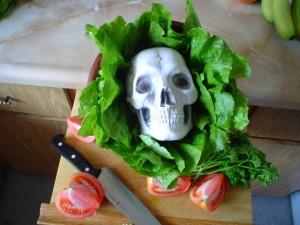California Department of Public Health (CDPH), Food and Drug Branch (FDB), Emergency Response Unit (ERU) investigated a multi-state foodborne illness outbreak of Escherichia coli O157:H7 (PulseNet Cluster ID 1310CAEXH-1) linked to the consumption of pre-packaged salads purchased in October 2013 at multiple retail locations. The outbreak included a total of 33 ill persons in 4 states; Arizona (1), California (28), Texas (1), and Washington (3). The illness onset dates ranged from October 5, 2013 to November 1, 2013. The case patients had a single matching strain of E. coli O157:H7 (XbaI EXHX01.0589 and BlnI EXHA26.3182).
 Initially, two varieties of Trader Joe’s salads were suspected food vehicles in this outbreak. These Trader Joe’s salads were produced by the same manufacturer, Atherstone Foods Inc. in Richmond, CA. As the epidemiological investigation progressed, two additional salads were identified as possibly causing illness.
Initially, two varieties of Trader Joe’s salads were suspected food vehicles in this outbreak. These Trader Joe’s salads were produced by the same manufacturer, Atherstone Foods Inc. in Richmond, CA. As the epidemiological investigation progressed, two additional salads were identified as possibly causing illness.
One of these salads was manufactured by in Oakland, CA, while the other salad was also manufactured by Atherstone Foods Inc., for the Walgreens chain of drug stores. Analysis of the common ingredients among all four salads revealed that romaine lettuce was the only common component. FDB narrowed the traceback to romaine lettuce and determined that a single field of romaine lettuce in Modesto, CA, grown by Ratto Bros. could have been used in the production of all four salads. FDB and the United States Food and Drug Administration (FDA) conducted an environmental investigation at Atherstone Foods, Inc. (DBA: Glass Onion Catering), in Richmond, CA. Seven retain product samples (consisting of the two implicated Trader Joe’s salads) were collected by FDB and tested by the Food and Drug Laboratory Branch (FDLB) in Richmond, CA. These samples were negative for E. coli O157:H7. The inspection at Atherstone Foods, Inc. did not result in any food safety violations or potential areas of cross-contamination. FDB and FDA continued the outbreak investigation at the grower of the suspected romaine. Investigators inspected Ratto Bros. procedures related to growing, handling and transport of the suspect romaine lettuce. Distribution documents, farm conditions, and water systems used by Ratto Bros. were reviewed in detail. Five of 44 environmental samples collected from areas around the implicated ranch were positive for E. coli O157:H7. One of these samples was obtained from a private road while the other four samples were collected on public roads near the implicated field. The positive samples were not a genetic match to the outbreak strain. FDB could not determine the root cause of contamination to the salads implicated in this outbreak. Investigators identified factors during the investigation at the implicated field that could have contributed to contamination of romaine in a farm environment. These potential factors were wind transferring pathogens from contaminated areas to growing fields and farm equipment contaminating crops after using public roads shared with neighboring cattle operations. Ratto Bros. management responded to the Department’s findings by enhancing their current procedures and adopting new procedures in an effort to prevent potential contamination events in the future.
